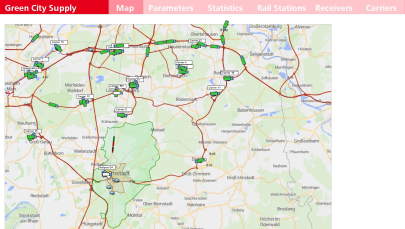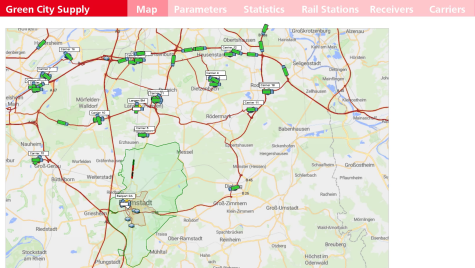In view of the high traffic volume and the on-going emission problems in German cities, new concepts are needed for urban freight transport. In order to achieve a reduction in the traffic and emissions impact of inbound HGVs, the consolidation and shift of transports to more environmentally friendly alternatives offers significant potential for improvement. Although rail freight transport is generally regarded as an environmentally friendly mode of transport, it has so far rarely been considered in the context of urban freight transport. Although there have been some case-by-case solutions for integrating rail freight transport in the past, there has been no widespread use. Also in research, the integration of the rail freight transport into the urban logistics chain has already been discussed at several points, albeit not yet examined in depth.
The project “Green City Supply” investigates under which conditions and for which use cases rail freight transport can be integrated into the supply of cities in the form of intermodal road-rail concepts in the future. Rail freight transport could be used specifically for the transport of partial loads to central inner-city transhipment points. Due to the mostly advantageous inner-city location of railway stations, these could be used as central transshipment points for the final distribution of goods by means of cargo bikes or other environmentally friendly means of transport. In addition, greater use of rail freight transport could lead to bundling effects in the “main leg”, which would reduce the transport volume and consequently the emission and traffic load.
Since rail freight transport has rarely been integrated into urban freight transport to date, it is unclear under which conditions and for which applications rail freight transport could offer an interesting alternative in the future and what ecological and economic potential would result from this. In order to answer this question and give recommendations for the possible implementation of the concept idea, an agent-based simulation model of an urban region will be developed in the project. This model will be used to experimentally investigate under which conditions (e.g. transport policy regulations) and for which types of freight transport demand rail freight transport could be integrated as a sustainable and cost-effective alternative to the supply of urban regions.
Key Data:
Project Duration: August 2018 to May 2019
Funding: This project (HA project no.: 634/18-57) is funded by the State of Hesse and HOLM as part of the “Innovations in the field of logistics and mobility” measure of the Hessian Ministry of Economics, Energy, Transport and Regional Development.
Partners: DB Cargo AG, IHK Darmstadt Rhein Main Neckar
Project lead: Christian Friedrich




